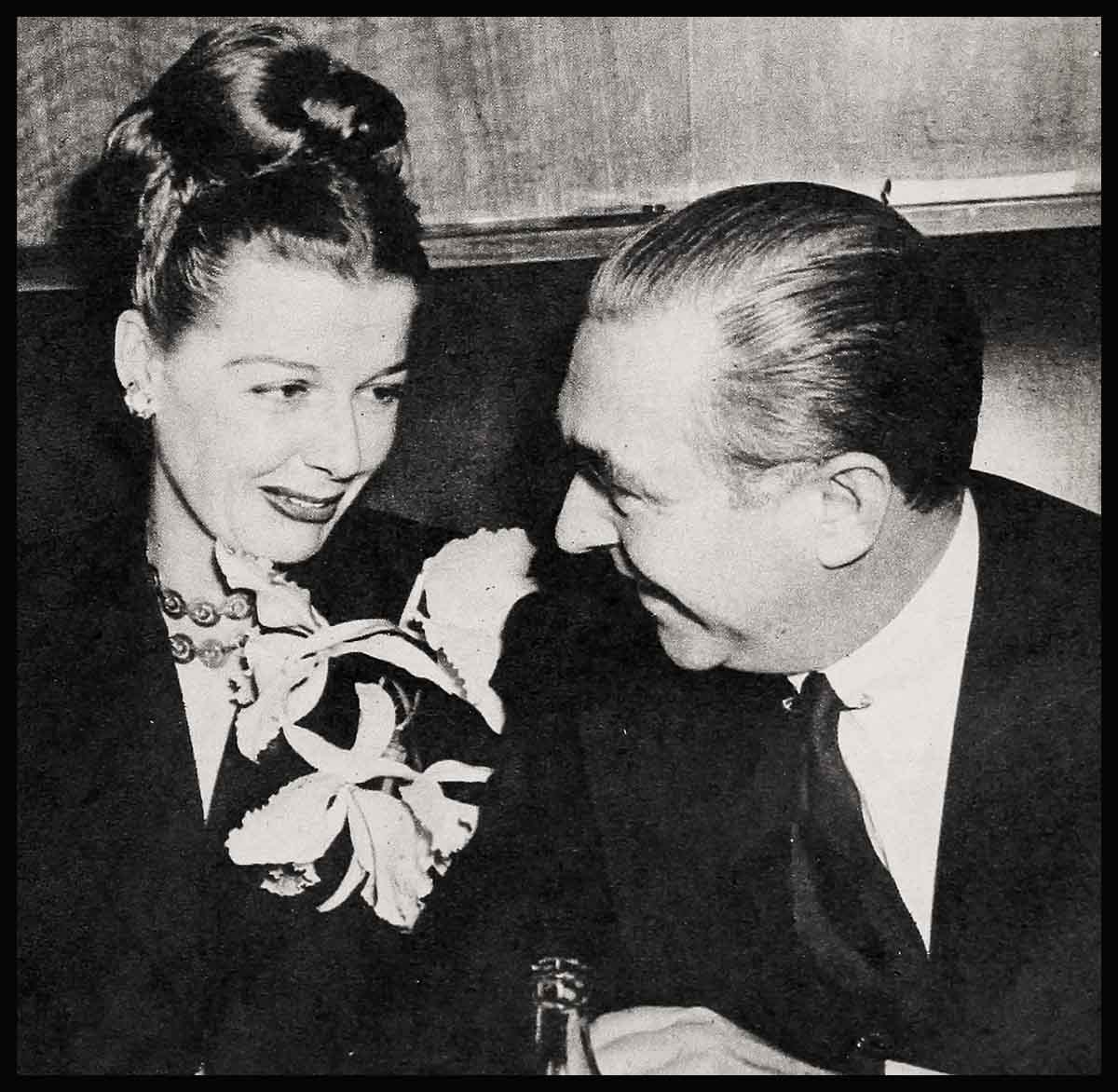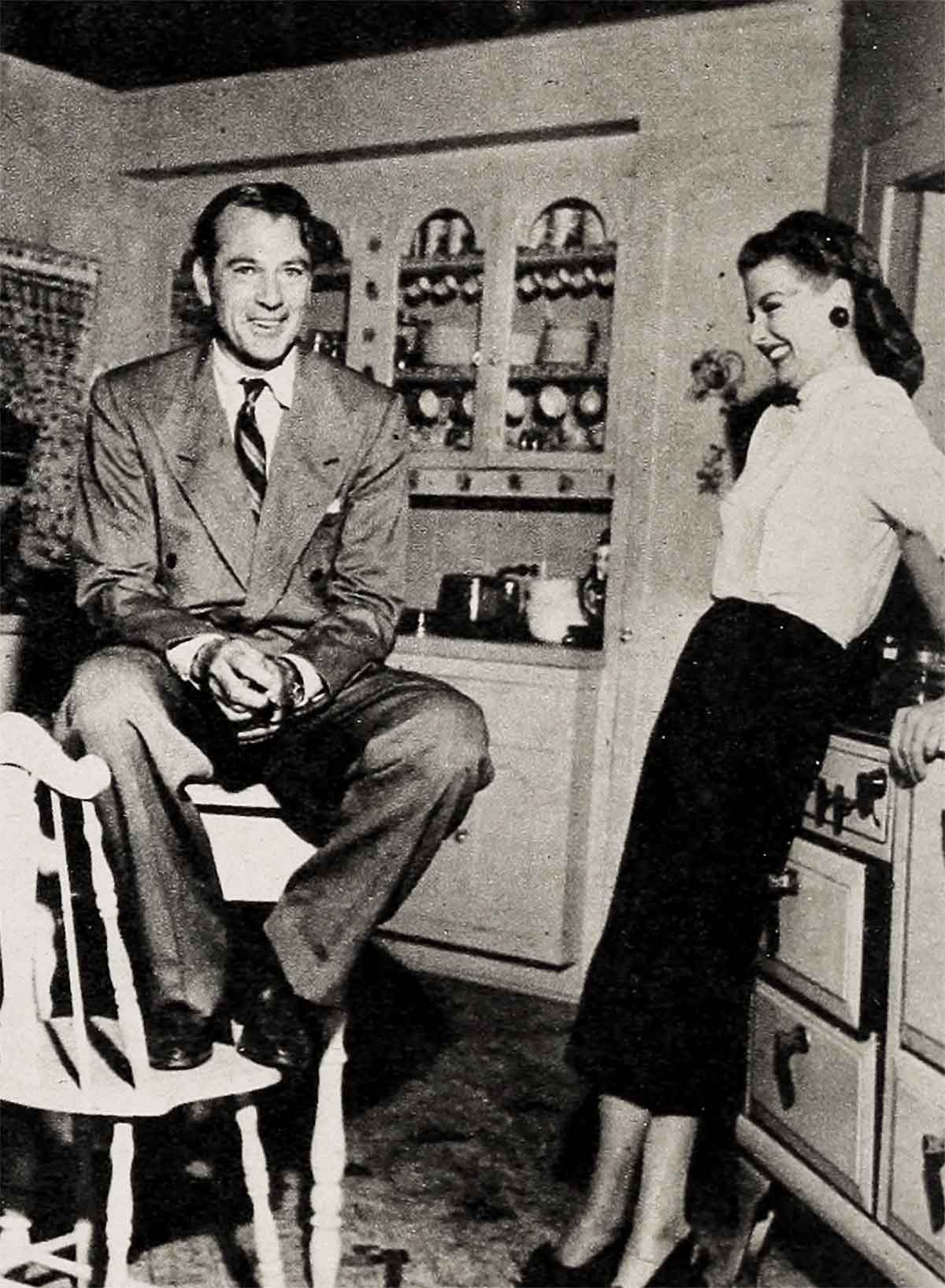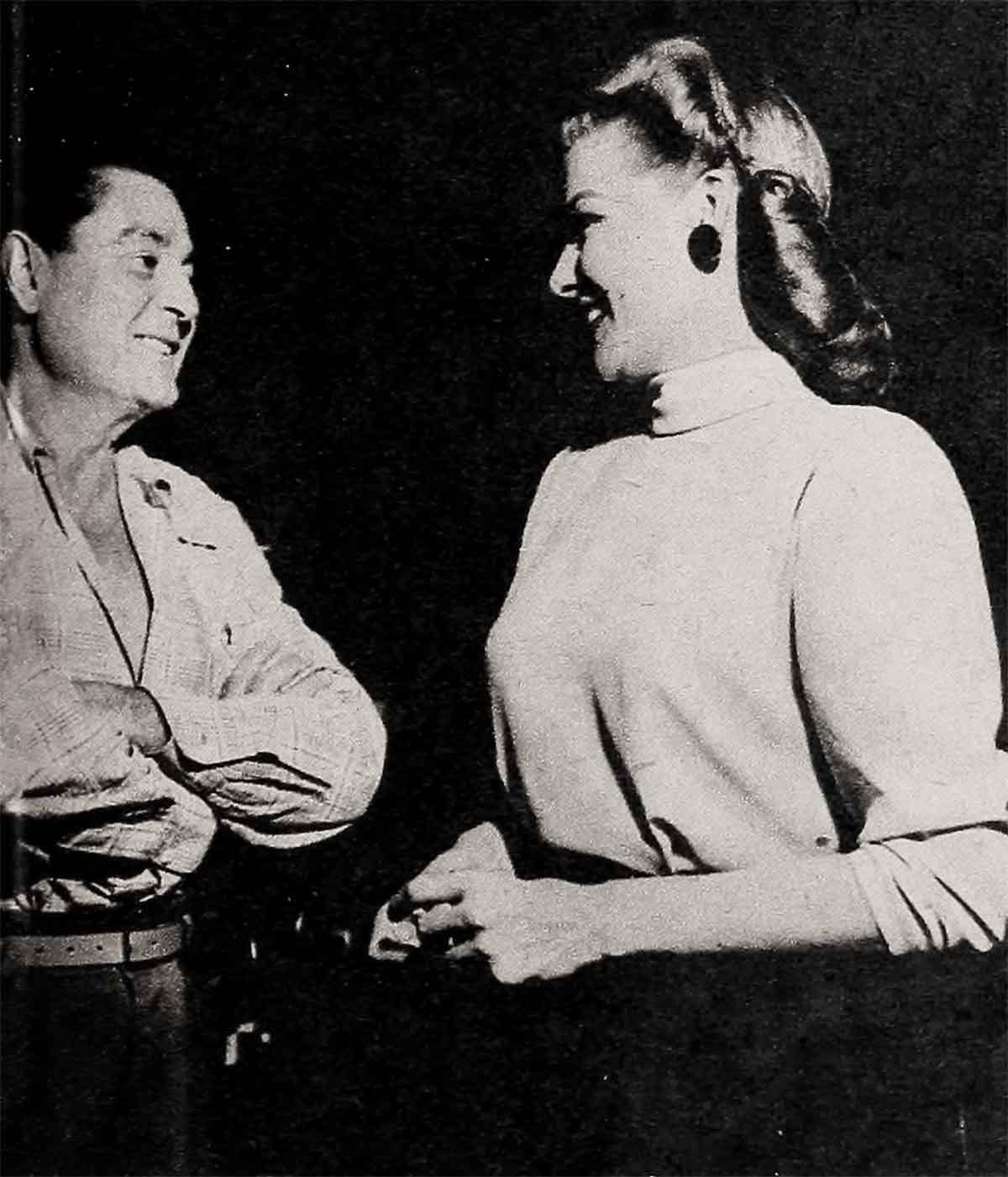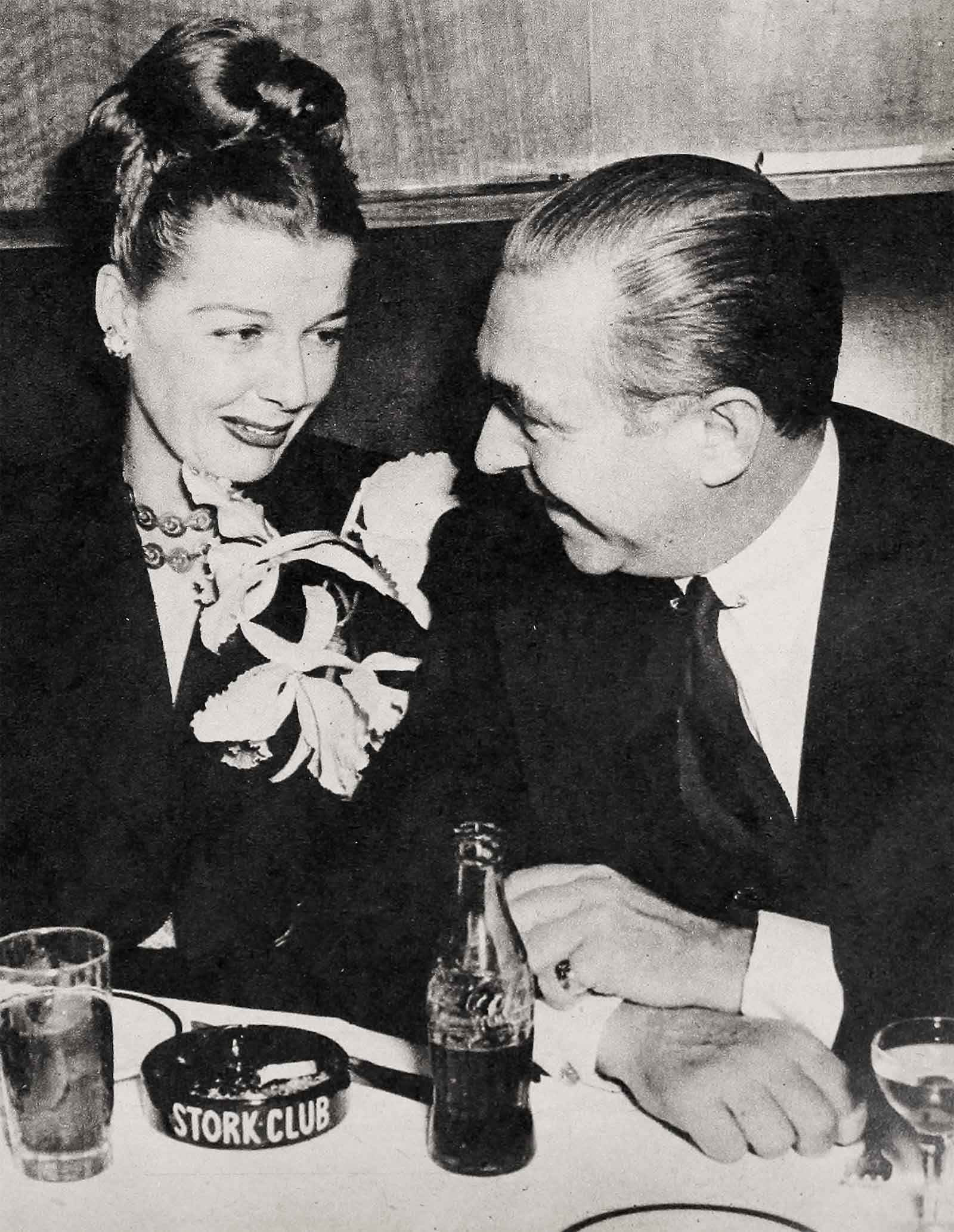
“Why Don’t You This Get Married?”
“O’Toole called this morning. He sent you his love,” said Ann Sheridan, handing me my Sunday paper at the front door.
She calls Steve “O’Toole” sometimes.
“You send that guy my love right back, special delivery!” I said.
“Over my dead body,” grinned Ann. “I’m protecting my own interests.”
I might as well say right now that Ann Sheridan’s my favorite type of gal. I like her. She’s straight from her slim shoulders, level out of her brown eyes. I’d called her up the day before. “How about Sunday breakfast with a very nosey lady? Object: the lowdown on Ann Sheridan for MODERN SCREEN.”
“The lowdown’s easy,” chuckled Ann. “But the breakfast—I don’t know—what time? That’s Annie, I smiled to myself. Pulling no punches. Golly, the girl thought I was an early riser, maybe, like President Truman. On Sunday I’m not.
“How’s noon?” I suggested.
We settled on one o’clock. Ann wore beige slacks, a corn yellow sport shirt, her own red hair and an apologetic look for keeping me up past my breakfast hour. She explained, while I rustled a silver fizz for two, toast, eggs and coffee, that the daughter of her business manager was getting married that day. “I’ve got to see that that wedding goes off right,” grinned Sheridan. “Old Aunt Annie, you know.”
I knew. Always doing something for somebody else. That’s Steve Hannagan’s style, too. That, maybe, is just one more of the millions of reasons that pair add up and make an even number. I thought of a slip of paper, a memo-pad page, I kept upstairs with my sentimental treasures. It wasn’t much to look at. In fact, all it said, scribbled in a famous hand was, “You’re a liar!”
The man who wrote that was one of the best loved newspaper men in the world—Damon Runyon. He scribbled it at a table at the Stork Club one afternoon. He couldn’t talk, because of the cancer that was later to kill him. He’d written first, “Why didn’t we ever get together when I was in Hollywood?”
“Because,” I kidded him, “you were too busy with the big boys to pay any attention to poor little me.” That’s when he indignantly scribbled the sentence I’ll always keep. But what does that have to do with Ann Sheridan and the man she loves, Steve Hannagan?
Well, the afternoon that Damon Runyon wrote that was Thanksgiving Day. I’d flown into New York from Hollywood without telling a soul. But in my lonely hotel room, I weakened. I wanted to see somebody and Steve popped into my mind. Steve is like a ton of sunshine. He’s a big, good-looking Irishman, in his iron-gray forties, and along with Ben Sonnenberg, he’s by way of being just about the best big-time press agent in the country. He knows everyone, loves everyone and vice versa. Anyway, I called Hannagan.

“It’s me,” I said. “I’m in town and, darn it, I’m lonely.”
He didn’t think a second. It just came out. “You’re having turkey dinner with ‘Chuck’ and me, and I’ve got another customer you’ll like. Be ready in a half-hour.”
I was ready.
It was a swell feast, and Damon and I left with the memory of one of the best Thanksgivings we’d ever spent. It wasn’t until it was almost over that Annie made a slip. “Two turkeys is one too many,” she gasped. “I feel like the ‘Chubby Sheridan’ I was when I first came to Hollywood.” Steve looked dismayed, but the secret was out. You see, they’d already had one Thanksgiving dinner when I called, but it didn’t take a split second for Steve and Ann to face another one to make me and Damon Runyon happy.
Well, that’s the way that pair figures, straight from their big Irish hearts. I know how happy Ann has been ever since she and Steve discovered each other. She told me their story. Steve had been lonely before, too—if you can imagine a man like Steve Hannagan lonely. His close friends know the story of his break-up with his pretty ex-wife model, Susan Crandall; they knew Steve needed companionship with the right girl. Somebody said, “There’s one girl you’ll be crazy about, Steve. She lives in Hollywood and her name’s Ann Sheridan.”
Steve knew who she was of course; he’d seen her pictures, but that was all. On his flying trips West he’d never met her, but that didn’t stop his friends. They kept up the cupid campaign from both ends, needling Steve about Ann, telling Ann about Steve. They never changed the rave record. Then Ann took a trip to New York. How Steve Hannagan knew she was arriving and where she stopped, I don’t know.
At any rate, no sooner had Ann unpacked her bags at the Hotel Gotham than the bellboy rapped. He handed her an old fashioned nosegay. A bouquet crammed with sweetheart roses, forget-me-nots, violets—the kind of a posy package a 16-year-old girl dreams about. Ann was no teen-ager, but she liked it, too. And she liked the way the note on it read—frank, aggressive and right to the point:
“After all the build-up,” Steve had scribbled, “what are you going to do about it? Call Plaza Such-and-Such Number. Steve Hannagan.”

beginning of the beginning . . .
So Ann called.
They had a date that night and they’ve had one every night since—whenever they’ve both been in the same town.
I don’t think it’s taking one thing away from Ann, to say that her friendship with Steve has improved her, both as a woman and a star.
Ann’s a two-fisted fighter by nature; her red hair’s out of no bottle. She’s proved that time and again. For instance, she holds the long-distance star suspension hold-out record in Hollywood—eighteen months saying “No” to her bosses, the Warner Brothers. She risked a risky year-and-a-half off the screen from one picture to the next, for the stubborn Irish courage of her convictions.
The carrot top from Texas put up quite a scrap. But you’d be surprised how a pair of broad shoulders and a keen mind like Steve’s backing you up can help.
Ann Sheridan’s not the type to look back on the mistakes of her life with self-pity, but she is the type frankly to admit them. That Sunday morning in my kitchen, I learned a lot about her I hadn’t known.
“I was a chubby, impossible brat, fresh from Texas when I first saw Hollywood,” Ann told me. “I was seventeen and I didn’t know beans with the bag open. You know how I got thin? By wearing corsets. I laced them in so tight to look slim on the screen that I could barely breathe, let alone eat. When you’re squeezed up like that there isn’t room for food!”
Ann didn’t yearn to be a great actress overnight; she didn’t mind playing the unending run of “wise dames.”
the unexpected . . .
But she did burn when she walked into a banquet at the Town House in Los Angeles and found that an enterprising studio press agent had labeled her “The Oomph Girl,” without even letting her know.
And even then Ann didn’t suspect how Oomph was to fasten on to her, make her miserable personally, wreck what chances she had for real acting jobs, and brew trouble between her and her bosses.
Ann had a lot of early bad luck. Her career limped along for years, and even after she’d battled and won the right to make King’s Row and proved herself a valuable star, back again she dropped to things like The Doughgirls. Along the way, her temper flared several times and she drew strikes and suspensions, winding up with that 18 months of saying “No” between The Doughgirls and Nora Prentiss. Ann might still be out on strike or back to the factory formulas, if during that 18-month holdout she hadn’t met Steve.
Before Ann ran into Steve, she’d had as bad luck with romance as she’d had with pictures.
Annie’s first marital mistake was Edward Norris. Eddie’s a swell guy, a fine flyer and a darned good actor, but theirs was puppy love, not deep or well-founded. They parted friends, sadder but wiser, after two years.
During the war, Eddie, strangely enough, instructed at the same flying field where Ann Sheridan’s second ill-fated mate served in the same capacity. George Brent, I mean. That was strictly a set romance at Warners which started on One Way Passage and it was too bad it did—for Ann Sheridan, that is. I like George, but he’s a moody man, a black Irishman, whom nobody has been able to live with happily.

George totes a possessive, lord-and-master complex that just couldn’t work with a girl like Ann Sheridan. He wanted a minute-by-minute account of every hour of her day when she wasn’t with him. In a busy town like Hollywood, there has to be mutual trust; or it’s disaster.
Annie told me a story—funny story I was about to say—only it wasn’t, really. Before George came into her life, another beau of Ann’s presented her with a beautiful bracelet and she loved it. Ann became Mrs. George Brent, and moved into his Toluca Lake House, he picked on that bracelet to vent his jealous tizzies. Finally, one day, Ann got so sick of George’s unreasonable envy of an old love token that when he made his usual fuss, she flung open the window and hurled the bracelet out into Toluca Lake. That made him happy—for a few minutes—but the funny part was, as Annie told me—
“I expected to remember where I’d tossed it, then dive in and pick it up later on. But darn it, I forgot where I’d thrown it! I’m still diving for that bracelet!”
So there was no real love in Ann Sheridan’s private life and nothing in her career much except the Oomph that nauseated her, until she discovered Steve.
Ann was on her second “strike”—the long 18 month one—and her second trip to New York when she and Steve got together. Steve knew just what to do about the girl he fell for. He hired Thurman Arnold, the Washington trust-buster, for Ann’s attorney, and they came to Hollywood.
With expert legal advice and power behind her at last, Ann got a new contract with a script-approval clause. She came back with a good part in Nora Prentiss, followed up with The Unfaithful. Ann won some respect, at last, from her bosses. She had a real man behind her to demand it. When the biggest chance of her screen career came up, Ann could grab it.
I’m talking about Good Sam, in which Ann will co-star with Gary Cooper for Leo McCarey. Somebody else cinched Good Sam for Annie—Jean Arthur. Jean was Leo’s first choice for the role; but she had other contracts that interfered.
“I’ll tell you who’d be better than I,” said Jean sincerely, “Ann Sheridan.”
Leo leaped on that casting hint, and the deal with Warners was made.
I’ll eat my hats . . .
I never saw an actress so enthused about doing a picture as Ann Sheridan is about Good Sam. If, afterward, she isn’t right up in Ingrid Bergman’s league, I’m set to munch some of those hats Annie and Steve are always sending me from Lily Daché’s.
I couldn’t work up a weak worry wart if I tried, about that rosy picture of top star success changing Annie Sheridan, herself, one smidgin. Her best friends are her hairdresser and wardrobe girl. She’s sticking right in the same modest ranchhouse she’s had for years in the San Fernando Valley. She’s fixed it up cozily, Mexican style, but she never has tossed her money around and still doesn’t.
For years Ann wanted a swimming pool, and the other day she got a contractor’s bid. “Twenty-five thousand dollars!” Annie told me indignantly. “Did I use up all my old Mexican cuss words at that!”
What she told that contractor was, “I can still walk down the street and swim at Ray’s. No thanks.” Ray is Ray Hendorf, her cameraman, and another long-time pal.
There’s one way Ann Sheridan has changed since she fell in love with Steve Hannagan. It’s trite—but she’s blossomed. She’s been sharpened up, polished in every way by the life Steve introduced her to. Annie used to be quiet and uncommunicative. After a picture, she always ducked out for Mexico, where she felt at home, being a Texas border girl and speaking Spanish like a native. She used to live in cotton dresses, peon skirts, slacks and sport clothes. Today she’s as smartly a dressed girl as ever tripped down Fifth Avenue.
She’s met all the big newspaper men; Steve’s friends—Walter Winchell, Len Lyons, Sherman Billingsley, Morton Downey—are hers, too. Her home away from home is the Stork Club and Twenty-One. She’s dropped her shyness for a poise that’s very becoming.
Ann sat at my table not long ago at a Newspaper Publishers convention. One of the publishers’ wives had an autograph book and asked Annie for her signature. “Oh, good,” smiled Ann, “here, let me get you some more.” So up she hopped and toured the big room to the rest of the Hollywood celebrities, collecting autographs for the happy lady. Ann Sheridan could never have done that in the years before she met Steve. I wouldn’t say she’s caught Steve’s expansive, friendly personality, exactly. I think it was always there. But Steve brought it out in Ann. She can match him now, story for story, and when that pair gather at my house with Babe Blum, Jack Benny’s sister-in-law, and Ann’s best friend, and a party of others, she keeps us in stitches.
When Steve’s in town, they’re at all the Hollywood parties and one of the most swarmed about pairs there. When Steve’s out of town, Annie walks alone. He’s not only her best but her only boy friend.
Ann and Steve necessarily carry on a long-distance romance. There’s a busy wire from Hollywood to wherever Steve happens to be. Last summer, Ann visited Steve’s country place near New Milford, Connecticut, up on- Candlewood Lake, where Steve likes to get away to fish and boat. I’d heard that Annie busied herself painting green shamrocks on the trees, barn door, and even the rocks around Steve’s place, but she assures me that was a gross fabrication.
“I kept busy painting them out,” explained: Annie. “Steve’s former wife put them there,” she laughed.
I knew I could ask Annie the biggest question I had back in my mind and get an honest answer. So before she bustled off to run her friend’s daughter’s wedding, I asked her what about her own.
“Why don’t you and Steve Hannagan get married?” I said, just like that. I knew they were thoroughly in love, had been for five years or more. I knew they were both legally free. I knew, too, that Ann, raised a hard-shelled Baptist in Texas, had switched to the Catholic faith, Steve’s religion—although she’d done that before she ever heard of Hannagan. There were no real barriers that I could see to a perfect match. But I felt Ann would tell me straight. She did.
“Why marry,” Annie asked me back, “and spoil a perfect friendship?” Her brown eyes were serious, her smile pleasant but firm. “Maybe it’s something I can’t explain,” she said, “but I’ve had two tries at marriage and two unhappy experiences. Maybe marriage isn’t for me. Why try again and risk spoiling the best friendship I’ve ever known?”
I’m not Dorothy Dix. I haven’t an answer to that—except maybe the old standby that “the third time’s the charm.” But too many emotions, feelings, intricate personality makeups figure in—and you can add the complications of two careers. I’m only sure about one thing when I look at Ann Sheridan and Steve Hannagan. That is that I like ’em. I wish them the most of the best, always. I think they’ll have it, too. In fact, I think they already have.
THE END
—BY HEDDA HOPPER
It is a quote. MODERN SCREEN MAGAZINE DECEMBER 1947





No Comments